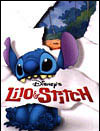 The
Hawaiian word ohana means "family," a family
in which "nobody gets left out or forgotten," according
to the animated tale Lilo & Stitch,
codirected by Dean Deblois and Chris Sanders. In the prologue
to the film, naughty Six-Two-Six (voiced by codirector Chris
Sanders) has been banished from the galaxy, but while being
escorted to a galactic Siberia, Six-Two-Six escapes. The Grand
Councilwoman (voiced by Zoe Caldwell) then orders Jumba (voiced
by David Ogden Stiers), a galactic prisoner due to his creation
of Six-Two-Six, to capture the monster in exchange for his
freedom, but Pleakley (voiced by Kevin McDonald) goes along
to assist. Meanwhile, orphaned five-year-old Lilo (voiced
by Daveigh Chase) is at a hula school on the island of Kaua`i.
Rather than waiting for her big sister Nani (voiced by Tia
Carrere) to drive her home from school, she walks home and
locks herself inside. When Nani finds that she is not waiting
at school, she rushes home. But along comes a social worker,
Cobra Bubbles (voiced by Ving Rhames), for a home visit, which
proves to be a disaster, so the social worker warns Nani that
Lilo may have to be removed from her guardianship. That night
Six-Two-Six lands not far from Lilo's home and ends up at
a pet shop. The next day Nani allows Lilo to adopt any pet
in the store, and Lilo chooses Six-Two-Six, claiming that
it is a dog; for $2, Lilo gets a legal document indicating
ownership (rather than adoption!?), and she names the creature
"Stitch." Although Six-Two-Six was created to destroy,
Lilo is amused and likes Stitch. However, its misconduct not
only costs Nani her job but no employer will hire her after
seeing Stitch's destructive antics. Next, Jumba and Pleakley
fly to the island (though the island of Hawai`i, according
to their map!) in order to capture Six-Two-Six but bungle
the assignment. The Grand Councilwoman then arrives to reclaim
Six-Two-Six, but Lilo presents a legal document indicating
ownership, so she demurs. Then a turnaround occurs, the inevitable
happy ending, with Stitch adopting the aloha spirit and rebuilding
the house that it earlier destroyed, Nani gets a job due to
a tip from her surfer friend David Kawena (voiced by Jason
Scott Lee), and the social worker goes away. Native Hawaiian
activists, of course, are loudly criticizing the film as not
depicting the true Hawaiian culture. Lilo and Nani, however,
bicker with each other in a manner quite similar to the complaining
activists. David, more stereotypically, is a firedancer with
a sweet personality who is content to surf in his spare time.
There are many scenes of white tourists enjoying the beach
and other attractions, including David's firedancing. And,
to remind adults of an earlier era when Elvis Presley favored
the Islands in Blue Hawaii (1961),
his music is featured throughout. Although the thrice-repeated
definition of ohana is clearly the main message of the film,
the lesson on Native Hawaiian culture is obviously oversimplified
and syrupy. MH
The
Hawaiian word ohana means "family," a family
in which "nobody gets left out or forgotten," according
to the animated tale Lilo & Stitch,
codirected by Dean Deblois and Chris Sanders. In the prologue
to the film, naughty Six-Two-Six (voiced by codirector Chris
Sanders) has been banished from the galaxy, but while being
escorted to a galactic Siberia, Six-Two-Six escapes. The Grand
Councilwoman (voiced by Zoe Caldwell) then orders Jumba (voiced
by David Ogden Stiers), a galactic prisoner due to his creation
of Six-Two-Six, to capture the monster in exchange for his
freedom, but Pleakley (voiced by Kevin McDonald) goes along
to assist. Meanwhile, orphaned five-year-old Lilo (voiced
by Daveigh Chase) is at a hula school on the island of Kaua`i.
Rather than waiting for her big sister Nani (voiced by Tia
Carrere) to drive her home from school, she walks home and
locks herself inside. When Nani finds that she is not waiting
at school, she rushes home. But along comes a social worker,
Cobra Bubbles (voiced by Ving Rhames), for a home visit, which
proves to be a disaster, so the social worker warns Nani that
Lilo may have to be removed from her guardianship. That night
Six-Two-Six lands not far from Lilo's home and ends up at
a pet shop. The next day Nani allows Lilo to adopt any pet
in the store, and Lilo chooses Six-Two-Six, claiming that
it is a dog; for $2, Lilo gets a legal document indicating
ownership (rather than adoption!?), and she names the creature
"Stitch." Although Six-Two-Six was created to destroy,
Lilo is amused and likes Stitch. However, its misconduct not
only costs Nani her job but no employer will hire her after
seeing Stitch's destructive antics. Next, Jumba and Pleakley
fly to the island (though the island of Hawai`i, according
to their map!) in order to capture Six-Two-Six but bungle
the assignment. The Grand Councilwoman then arrives to reclaim
Six-Two-Six, but Lilo presents a legal document indicating
ownership, so she demurs. Then a turnaround occurs, the inevitable
happy ending, with Stitch adopting the aloha spirit and rebuilding
the house that it earlier destroyed, Nani gets a job due to
a tip from her surfer friend David Kawena (voiced by Jason
Scott Lee), and the social worker goes away. Native Hawaiian
activists, of course, are loudly criticizing the film as not
depicting the true Hawaiian culture. Lilo and Nani, however,
bicker with each other in a manner quite similar to the complaining
activists. David, more stereotypically, is a firedancer with
a sweet personality who is content to surf in his spare time.
There are many scenes of white tourists enjoying the beach
and other attractions, including David's firedancing. And,
to remind adults of an earlier era when Elvis Presley favored
the Islands in Blue Hawaii (1961),
his music is featured throughout. Although the thrice-repeated
definition of ohana is clearly the main message of the film,
the lesson on Native Hawaiian culture is obviously oversimplified
and syrupy. MH
I
want to comment on this film